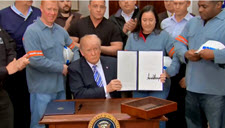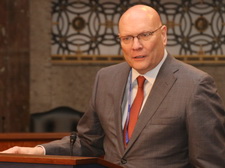Despite pushback from GOP leaders, congressional members and allies overseas, President Trump yesterday authorized levies of 25 percent on imported steel and 10 percent on aluminum to take effect March 23, while exempting Canada, Mexico and potentially other countries based on a country-by-country review of bilateral security agreements. (MarketWatch, March 8 and Bloomberg, March 9)
 |
President Trump authorized levies of 25 percent on imported steel and 10 percent on aluminum. |
The Presidential Proclamation exempts Canada and Mexico based on renegotiation of terms in the North American Free Trade Agreement (NAFTA) and includes a degree of flexibility for exempting other nations.
Roundtable President and CEO Jeffrey DeBoer noted the commercial real estate industry’s concerns, stating “For every job in the steel production industry, there are more than 50 jobs in the US construction industry (140,000 vs. 7-10 million). New tariffs on construction materials like steel could have the unfortunate, unintended side effect of raising construction costs and reducing jobs in real estate development. Exemptions will be important to mitigating the harm to the US economy.”
In response to Trump’s initial tariff announcement last week, Senate Majority Leader Mitch McConnell (R-KY) commented on Tuesday, "There is a lot of concern among Republican senators that this could sort of metastasize into a larger trade war.” (NPR, March 8)
 |
Roundtable President and CEO Jeffrey DeBoer: "New tariffs on construction materials like steel could have the unfortunate, unintended side effect of raising construction costs and reducing jobs in real estate development. Exemptions will be important to mitigating the harm to the US economy." |
A March 7 letter to Trump from 107 House Republicans, including Ways and Means Chairman Kevin Brady, expressed concern that “adding new taxes in the form of broad tariffs would undermine” the economic benefits in recently-passed Tax Cuts and Jobs Act legislation. The letter also suggests conditions for imposing tariffs to minimize negative consequences.
European Central Bank (ECB) President Mario Draghi said in a news conference yesterday, “If you put tariffs against what are your allies, one wonders who the enemies are.” Discussing the potential effects of the tariffs, he added, “Is there going to be a retaliation or not? What’s going to be the response of the exchange rate? …and the effect on confidence is very difficult to assess.” (CNBC, March 8)
The tariff announcement comes after a recent White House infrastructure proposal that seeks to leverage $200 billion in federal funding to leverage $1.5 trillion in local, state and private funding over the next decade. Higher tariffs on imported steel and aluminum could present new challenges to obtain the raw materials needed for extensive infrastructure projects. Funding options for the Trump administration’s infrastructure proposal were discussed during a March 6 House Transportation and Infrastructure Committee that featured Transportation Secretary Elaine Chao. (Hearing, March 6)